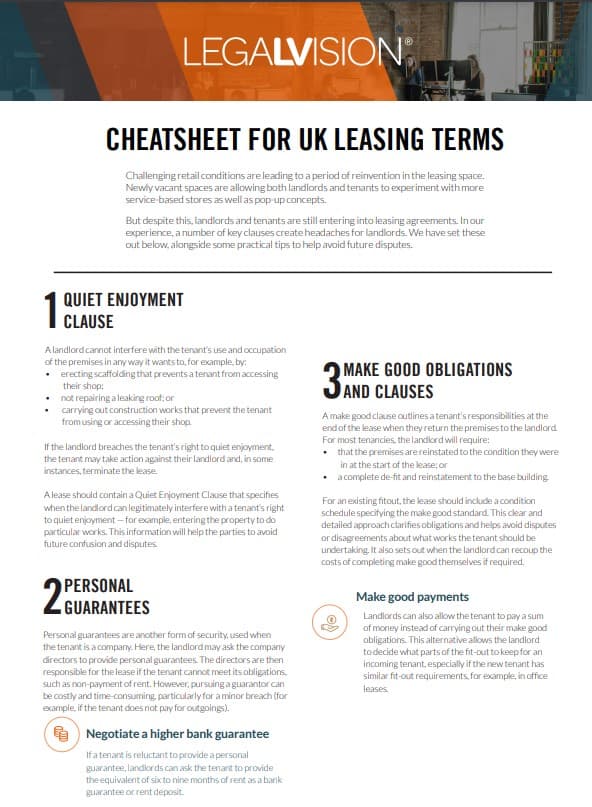Table of Contents
As a commercial tenant, it may be necessary to make alterations to the commercial property you are leasing. However, the kinds of alterations you can make will usually depend on the type of premises and the amount of control the commercial landlord has over their commercial property. If you make alterations to the property contrary to the lease agreement, you might face a costly dispute. To help you avoid a lease dispute, this article explains the different alterations a commercial tenant may make to a commercial lease.
Changes to the Exterior and Structure
Most commercial lease agreements generally prohibit changes to the exterior and structure of the commercial premises. Your commercial lease agreement likely refers to all external vertical services as ‘elevations’.
Practically speaking, a landlord is unlikely to allow any alterations by a tenant to the outside of the leased premises. After all, a commercial landlord will want to ensure that alterations do not make it difficult to let their property in the future.
Non-Structural and Interior Changes
Most commercial leases will allow the commercial tenant to make alterations to the interior of their commercial premises. However, commercial tenants usually need to obtain the landlord’s prior permission prior to making these alterations, unless the alterations count as improvements.
Where alterations do not require the landlord’s consent, the lease may specify that the tenant should still let the landlord know these will occur. Often, all changes to the commercial property will be in a formal written licence. This will detail:
- a specific description of the alteration;
- rules about how to carry out the alteration;
- information about how the alteration may affect any rent review; and
- whether the tenant must remove the alteration work at the lease end term.
Also, a tenant may be able to make internal changes without the landlord’s consent, whether it is for the installation of demountable partitionings, such as getting rid of an office that is made from non-structural walls. If so, the lease should contain a provision allowing this.
While most commercial leases will allow interior alterations with the landlord’s consent, the lease may state how any alterations should occur. For example, the lease may ask the tenant to:
- use materials for the work which are of good quality;
- carry out the work in a skilful fashion; and
- ensure that the alterations meet the reasonably satisfactory standard the landlord requires.
Call 0808 196 8584 for urgent assistance.
Otherwise, complete this form and we will contact you within one business day.
Changes to Service Media
In a commercial lease, it is unusual for tenants to be allowed to make changes to service media, particularly for the electricity supply. Concerning service media, a commercial lease will often prohibit alterations that negatively affect the energy efficiency of the commercial property.
Prohibited Alterations Under Lease Agreements
A commercial lease agreement might prohibit a specific alteration. However, if the alteration is an improvement under the Landlord and Tenant Act 1954, the landlord must let the tenant make the improvements, particularly where the tenant has a trade or business in it. An improvement is an alteration that:
- goes beyond repair; and
- improves the premises from the tenant’s point of view.
This is to say, if a commercial tenant occupies a property for their trade or business purposes and wants to make alterations that amount to improvement, the landlord has to allow them even if the lease prohibits it. You should note that a commercial tenant may legally be able to claim compensation from a landlord at the lease end term for these changes.

This cheat sheet outlines what you should be aware of in your lease agreement.
Key Takeaways
A commercial lease will generally state the different types of alterations that a landlord may permit in a commercial lease. For example, a commercial lease will not allow a tenant to make structural or exterior changes. However, most commercial leases allow non-structural and interior changes, granted the tenant first seeks the landlord’s permission. Changes to service media are not usually allowed under a commercial lease. It is also worth noting that a commercial landlord cannot prohibit improvements to commercial premises where the tenant has a trade or business in it.
If you need help understanding different types of alterations under a commercial lease, LegalVision’s experienced leasing lawyers can assist as part of our LegalVision membership. For a low monthly fee, you will have unlimited access to lawyers to answer your questions and draft and review your documents for a low monthly fee. So call us today on 0808 196 8584 or visit our membership page.
We appreciate your feedback – your submission has been successfully received.







